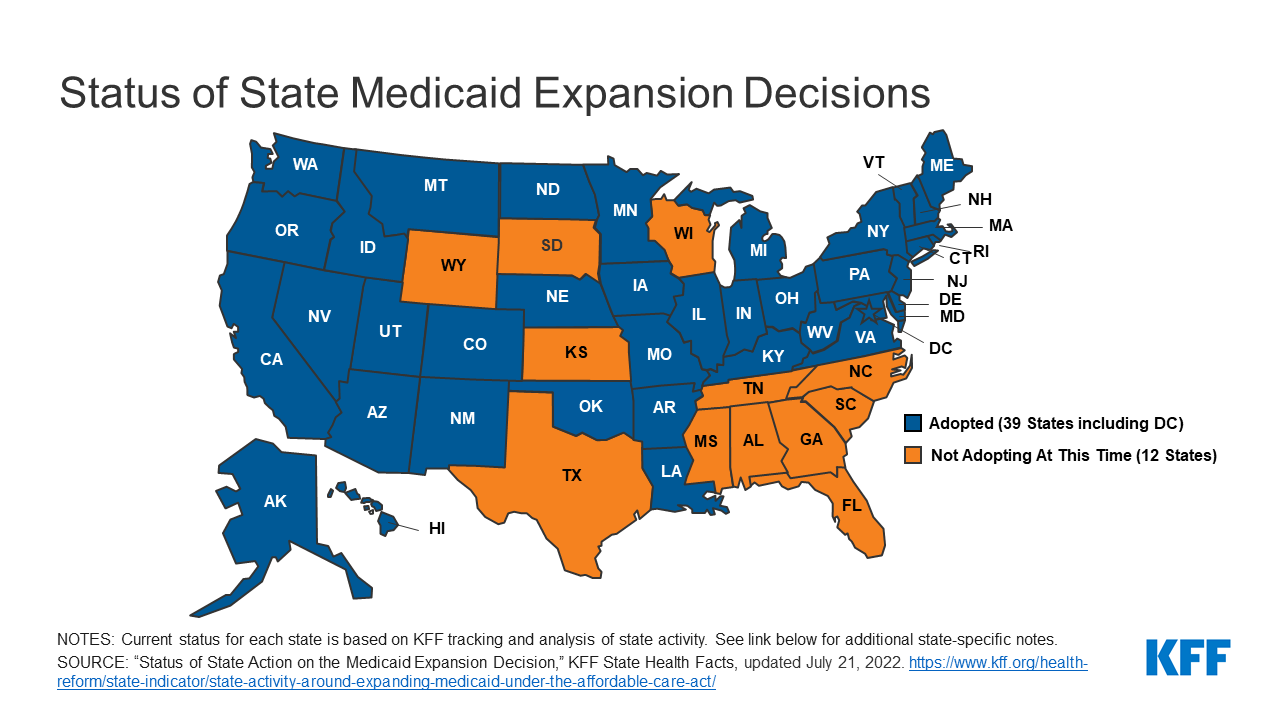A National Action Plan for Expanding Medicaid
President Biden and Democrats in Congress are on track to deliver unprecedented results to expand healthcare across the United States in the wake of the COVID-19 pandemic. President Biden and Vice President Harris have launched an unprecedented effort to expand maternal health with executive and agency actions bolstered by funding provided in the historic American Rescue Plan Act. This law also reduced the uninsured rate in the United States to just eight percent, the lowest rate in American history, with increased subsidies for the Affordable Care Act.
The proposed Inflation Reduction Act will continue these subsidies, which have made healthcare affordable for millions of additional people, for years to come. This bill, which could be signed into law as soon as mid-August, would also allow Medicare to negotiate the price of prescription drugs, cap drug costs for seniors, prevent companies from increasing prescription prices higher than inflation, and much more, which would be the biggest reduction in prescription costs that Congress could ever take. This is just the healthcare portion of the bill.
Congress is also considering the INSULIN Act, a bill that would not only cap the cost of insulin at $35 per month, but reform the entire insulin industry beyond that. Meanwhile, in April, President Biden signed an executive order fixing the family glitch, which will expand access to healthcare to 200,000 people and make costs lower for an additional one million. There is one final major healthcare promise that I would like to keep this year: reducing the high uninsured rate for black and Hispanic Americans.
The best way to do this is to expand Medicaid. Originally mandatory, a Supreme Court decision made expansion optional and left it to the states. This has resulted in millions of people in red states losing their access to affordable healthcare in the name of politics. States like Georgia, Texas, and Florida, home to large black and Hispanic populations, are among the states whose governments have not expanded Medicaid. Expanding Medicaid nationwide would reduce this racial disparity. When President Biden took office, 36 states had expanded Medicaid. In 2021, Oklahoma and Missouri joined them, expanding healthcare to hundreds of thousands of people. This year, in a major development, Democrat Roy Cooper and the Republican-controlled legislature reached a bipartisan agreement on Medicaid expansion. This will bring the total number of states that have expanded Medicaid to 39 and leave just 11 more to go.
This is a national action plan for expanding Medicaid in some of these 11 states:
- Re-elect Governor Tony Evers in Wisconsin: Evers is a staunch supporter of expanding BadgerCare to 83,000 Wisconsinites. His reelection would force Republicans in the legislature to quit their tactic of stalling in hopes of making Evers a one-term governor and force them to negotiate, something that we saw play out in North Carolina. This comes at a time when Robin Vos, the Assembly Speaker and most powerful Republican in Wisconsin who has also been the chief blocker of all progress in our state, is facing unprecedented political pressure from the Left and the Right that could sink him.
- South Dakota: Use a ballot initiative, similar to those that have been used and/or are being used to expand access to marijuana and protect reproductive freedom, to expand Medicaid.
- Wyoming: Use a ballot initiative parallel to the one in South Dakota to expand Medicaid in the same election cycle for the maximum effectiveness of organizing as well as the maximum political impact.
- Re-elect Governor Kelly in Kansas: Governor Kelly has been a champion for the people of Kansas, from fully funding schools and balancing the state budget to cutting taxes and eliminating the food tax while securing the largest economic investments and lowest unemployment rate in state history. She has also proposed the expansion of Medicaid in the state, and re-electing her in 2022 is the only way to make this happen.
- Elect Beto O'Rourke in Texas: As in every other state, Medicaid expansion is incredibly popular in Texas, with Greg Abbott being the chief barrier to expanding Medicaid in the largest state that has yet to do so. Electing Beto O'Rourke would be electing a fighter for the people of Texas and the healthcare they deserve.
- Elect Charlie Crist in Florida: Unlike Ron DeSantis, who appears interested only in keeping and expanding his own personal and political power, Charlie Crist will be a fighter for the people of Florida. Thankfully, unlike in Texas, the governor can do more than just put political pressure on the legislature in Florida. With enough signatures, Florida can amend the state constitution to enact Medicaid expansion.
- Elect Stacey Abrams in Georgia: Texas and Florida are the first two of the big three states that have not expanded or begun expansion of Medicaid, while Georgia is the third. Stacey Abrams has a long history of fighting for the people of Georgia, from preventing the largest middle class tax hike in state history to fighting back against racist gerrymandering and voter suppression, and putting her in the governor's mansion will make Medicaid expansion much closer to becoming a reality.
- This would leave just four states not likely to expand Medicaid on their own: Tennessee, Alabama, Mississippi, and South Carolina. The ideal impact of the aforementioned expansions would be to increase political pressure on Republicans in these states to listen to their constituents and expand Medicaid.
My goal is to expand the insured rate in the United States to 96 percent by 2030, which would cut the current rate of uninsured Americans in half and leave just four percent of Americans without access to reliable, affordable healthcare. The only step beyond that would be universal healthcare.

Comments
Post a Comment